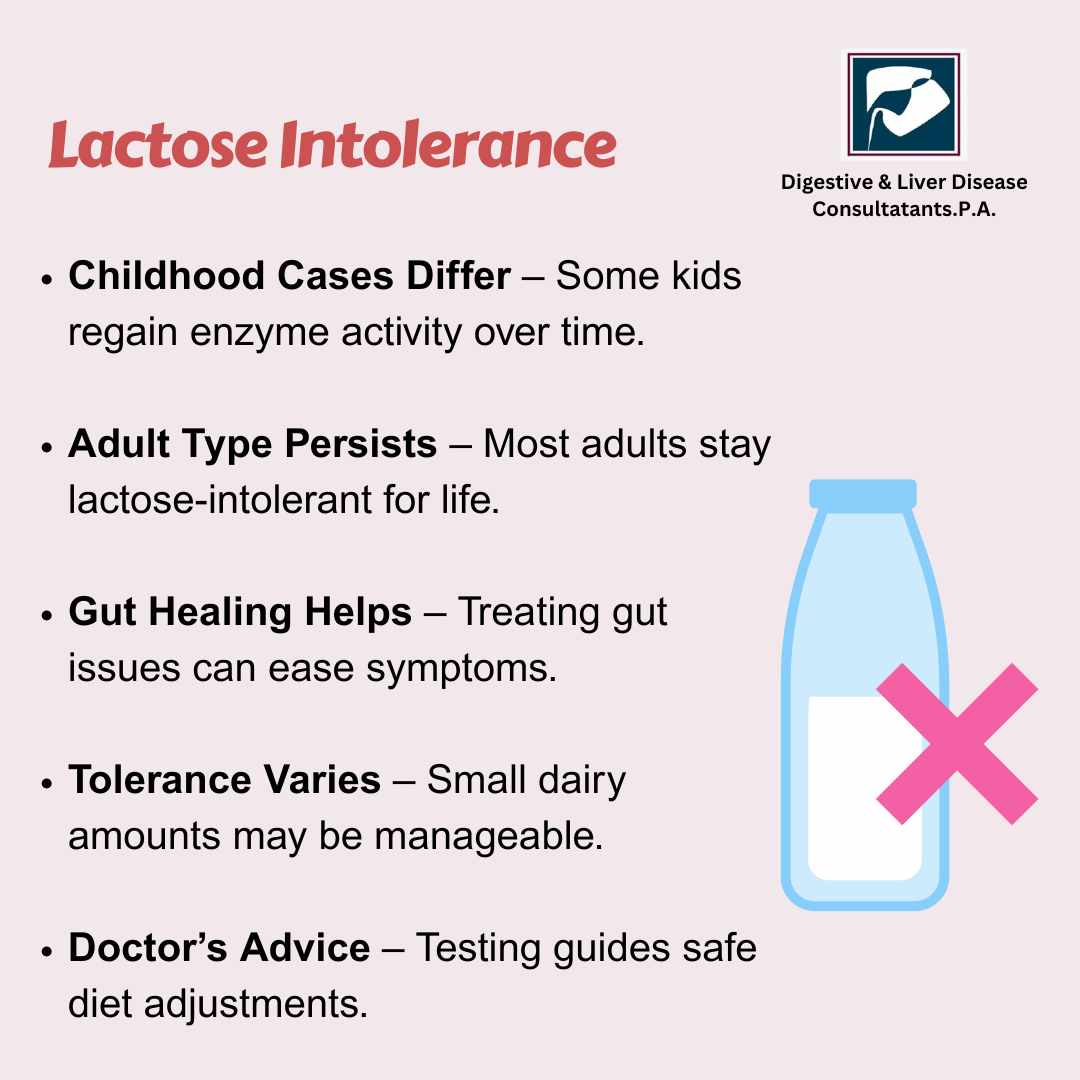If you have ever experienced stomach cramps, bloating, or discomfort after drinking milk or eating dairy products, you may have wondered whether you are lactose intolerant. Lactose intolerance is a common digestive condition, but an equally common question people ask is: Can you outgrow it?
The answer depends on what kind of lactose intolerance you have, your age, and how your body processes lactose. Let’s explore how lactose intolerance develops, whether it can improve over time, and what you can do to manage it effectively.
What Is Lactose Intolerance?
Lactose intolerance happens when your body cannot properly digest lactose, the natural sugar found in milk and other dairy products. Normally, your small intestine produces an enzyme called lactase, which breaks down lactose into simple sugars that your body can absorb.
When there is not enough lactase, undigested lactose passes into the large intestine, where bacteria ferment it. This fermentation causes gas, bloating, abdominal pain, and sometimes diarrhea.
Common symptoms of lactose intolerance include:
- Bloating or fullness after consuming dairy
- Abdominal cramps or stomach pain
- Gas and flatulence
- Diarrhea or loose stools
- Nausea
Symptoms usually appear 30 minutes to 2 hours after eating or drinking dairy products.

Types of Lactose Intolerance
There are different types of lactose intolerance, and understanding which one you have can help determine whether it might improve over time.
1. Primary Lactose Intolerance
This is the most common form and occurs naturally with age. Many people gradually produce less lactase after childhood. For most adults, especially those of Asian, African, or Hispanic descent, this decrease is permanent. Unfortunately, you cannot completely outgrow primary lactose intolerance, though you might still tolerate small amounts of dairy.
2. Secondary Lactose Intolerance
This type occurs due to an underlying condition that damages the small intestine. Diseases such as celiac disease, Crohn’s disease, gastroenteritis, or intestinal infections can temporarily reduce lactase production.
In this case, you can outgrow or recover from lactose intolerance once the intestinal lining heals. Treating the root cause often restores lactase activity, allowing you to enjoy dairy products again in moderation.
3. Congenital Lactose Intolerance
This is a rare genetic condition where babies are born with little or no lactase enzyme. It is lifelong and does not improve with age. These individuals must avoid lactose completely throughout life.
4. Developmental Lactose Intolerance
Premature babies sometimes have lactose intolerance because their intestines are not fully developed. As the baby grows, lactase production usually increases, and they can digest milk normally. So yes, in such cases, babies can outgrow lactose intolerance.
Can Adults Outgrow Lactose Intolerance?
For adults with primary lactose intolerance, the enzyme deficiency is genetic and permanent. However, many adults find that their tolerance level can change over time. For example, you might notice that small portions of cheese or yogurt don’t bother you as much as milk.
This happens because the gut microbiome can adapt slightly. Some bacteria in your intestines help digest lactose, making mild symptoms easier to manage. While this is not a true “cure,” it does mean that with time, your body may handle small amounts of lactose better.
If your intolerance is secondary (caused by an illness), then yes, you may fully recover once the underlying issue heals. For example, after treating celiac disease or recovering from a gut infection, your lactase production may return to normal.
Smart Tips to Manage Lactose Intolerance
Even if you cannot outgrow lactose intolerance completely, you can still enjoy a varied and balanced diet. Here are practical steps to help manage symptoms:
1. Know Your Tolerance Level
Start by eliminating dairy for a short period, then reintroduce it in small amounts to see how your body reacts. Some people can handle yogurt or hard cheese better than milk because these contain less lactose.
2. Choose Lactose-Free Products
Many brands now offer lactose-free milk, yogurt, and ice cream. These taste similar to regular dairy but have the lactose already broken down, making them easier to digest.
3. Take Lactase Enzyme Supplements
Over-the-counter lactase enzyme tablets or drops can help your body digest lactose when taken before eating dairy. These can be especially useful when dining out or traveling.
4. Eat Dairy with Other Foods
Consuming dairy as part of a meal can slow digestion and reduce discomfort. For instance, having milk with cereal or cheese with whole-grain crackers can help your body process lactose more easily.
5. Maintain Nutrient Balance
If you limit or avoid dairy, make sure you still get enough calcium, vitamin D, and protein from other foods. Alternatives include:
- Fortified almond, soy, or oat milk
- Leafy greens like kale and broccoli
- Canned salmon or sardines with bones
- Calcium-fortified juices and cereals
6. Watch for Hidden Lactose
Lactose can be found in foods you might not expect, such as salad dressings, bread, soups, and processed snacks. Always check food labels if you are sensitive.
When to See a Gastroenterologist
If you frequently experience digestive issues such as bloating, diarrhea, or abdominal pain after meals, it is important to seek medical advice. Sometimes, what seems like lactose intolerance could be another digestive condition such as irritable bowel syndrome (IBS), celiac disease, or small intestinal bacterial overgrowth (SIBO).
A gastroenterologist can help diagnose your condition through tests such as a hydrogen breath test or lactose tolerance test and recommend a personalized management plan.
About Digestive & Liver Disease Consultants, P.A.
At Digestive & Liver Disease Consultants, P.A., we specialize in diagnosing and treating a wide range of digestive and liver conditions. Our board-certified gastroenterologists are experts in managing issues like lactose intolerance, IBS, acid reflux, IBD, and liver disease.
We use advanced diagnostic tools and offer compassionate, patient-focused care. Whether you need help identifying food intolerances or creating a balanced nutrition plan, our team is here to guide you toward better digestive health.
Conclusion
So, can you outgrow lactose intolerance? The answer depends on the cause. Some people, especially those with secondary or developmental lactose intolerance, may recover fully. Others, particularly those with primary or genetic forms, may not, but can still manage their condition effectively through diet and lifestyle choices.
Listening to your body, choosing lactose-free alternatives, and seeking expert care can make a big difference in how you feel day to day.
If you suffer from ongoing bloating, discomfort, or digestive issues after eating dairy, schedule a consultation with Digestive & Liver Disease Consultants, P.A. Our best gastroenterologists will help diagnose your condition and create a plan that works best for you—so you can enjoy food without worry.






